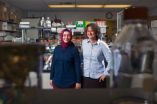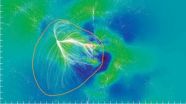(Press-News.org) The response of soil microbial communities to changes in temperature increases the potential for more carbon dioxide to be released from the world's soils as global temperatures rise, scientists have revealed.
The potential for global warming to stimulate decomposition rates in soils, and thus release large quantities of carbon dioxide to the atmosphere, has long been considered to be one of the potentially most important positive feedbacks to climate change. However, the results from more recent studies have suggested that responses within microbial communities could greatly reduce, or even eliminate, the potential for soil carbon losses under global warming.
This key idea was tested using soils collected from a thermal gradient from the Arctic to the Amazon rainforest. The results, published in Nature, show that, contrary to expectations, microbial community responses resulted in an overall increase, rather than a decrease, in the effects of temperature on rates of carbon dioxide release from soils.
Dr Kristiina Karhu of the University of Helsinki, and lead author of the paper, said: "Because soils store more than twice as much carbon than the atmosphere, changes in rates of decomposition and carbon dioxide release from soil could be very important. Our findings suggest that warming will increase the activity of soil microbes to a greater extent than was previously expected, which could have implications for future rates of climate change."
Responses were not found to be equal in all soils, and differed between geographical regions and ecosystem types. Managed agricultural soils stood out, being the only soils in which microbial community responses reduced the effects of a temperature change on rates of carbon dioxide release. On the other hand, the greatest stimulation was observed in the soils with the greatest carbon content and from boreal and arctic ecosystems, which are warming most rapidly. This indicates that the observed responses could increase the vulnerability of some of the world's most important soil carbon stocks to climate change.
Dr Iain Hartley, of the University of Exeter's College of Life and Environmental Sciences, added: "It is only relatively recently that we have recognised how important it is to understand soil microbial community responses to changes in temperature. Big advances have been made in recent years, and there are now models that simulate key microbial processes. We have a great opportunity to really advance this subject, and improve predictions of rates of carbon dioxide release from soils under global warming, but there is still a huge amount that we need to understand better."
INFORMATION:
The research took place within a Natural Environment Research Council (NERC)-funded project, led by the University of Exeter. The study also involved teams from the University of Aberdeen, Heriot-Watt University, University of Edinburgh, University of Stirling, and Rothamsted Research, with key collaborators in continental Europe, Australia and South America.
Carbon stored in the world's soils more vulnerable to climate change than expected
2014-09-03
ELSE PRESS RELEASES FROM THIS DATE:
Study shows cellular RNA can template DNA repair in yeast
2014-09-03
The ability to accurately repair DNA damaged by spontaneous errors, oxidation or mutagens is crucial to the survival of cells. This repair is normally accomplished by using an identical or homologous intact sequence of DNA, but scientists have now shown that RNA produced within cells of a common budding yeast can serve as a template for repairing the most devastating DNA damage – a break in both strands of a DNA helix.
Earlier research had shown that synthetic RNA oligonucleotides introduced into cells could help repair DNA breaks, but the new study is believed to be ...
Newly identified galactic supercluster is home to the Milky Way
2014-09-03
Astronomers using the National Science Foundation's Green Bank Telescope (GBT) -- among other telescopes -- have determined that our own Milky Way galaxy is part of a newly identified ginormous supercluster of galaxies, which they have dubbed "Laniakea," which means "immense heaven" in Hawaiian.
This discovery clarifies the boundaries of our galactic neighborhood and establishes previously unrecognized linkages among various galaxy clusters in the local Universe.
"We have finally established the contours that define the supercluster of galaxies we can call home," said ...
Longitudinal study explores white matter damage, cognition after traumatic axonal injury
2014-09-03
Traumatic Axonal Injury is a form of traumatic brain injury that can have detrimental effects on the integrity of the brain's white matter and lead to cognitive impairments. A new study from the Center for BrainHealth at The University of Texas at Dallas investigated white matter damage in the acute and chronic stages of a traumatic axonal injury in an effort to better understand what long-term damage may result.
The study, published online July 21 in the Journal of Neurotrauma, looked at 13 patients ages 16 to 60 with mild to severe brain injuries from the intensive ...
Bariatric surgical center accreditation improves patient survival and postop complications
2014-09-03
CHICAGO (September 3, 2014): Patients who underwent weight loss operations in recent years, when most bariatric surgical centers were accredited, had fewer postoperative complications and were 2.3 times less likely to die in the hospital than patients who had bariatric procedures performed before a national movement toward facility accreditation was taking place, according to new study findings. Study authors, who published their results in the September issue of the Journal of the American College of Surgeons, say these findings suggest that accreditation of bariatric ...
Is a gluten-free diet enough to control the complications of celiac disease?
2014-09-03
New Rochelle, NY, September 2, 2014—A lifelong gluten-free diet (GFD) is the conventional approach to managing celiac disease, a chronic inflammatory disorder affecting the small intestine that can result in malnutrition. However, recent evidence shows that a GFD may not be sufficient to prevent serious complications related to celiac disease. A detailed discussion of the metabolic disorders and functional abnormalities that can develop, and nutritional treatments for these is presented in a Review article published in Journal of Medicinal Food, a peer-reviewed journal ...
Innovative algorithm spots interactions lethal to cancer
2014-09-03
Despite the revolutionary biotechnological advancements of the last few decades, an ideal anti-cancer treatment — one that's immediately lethal to cancer cells, harmless to healthy cells, and resistant to cancer's relapse — is still a dream.
But a concept called "synthetic lethality" holds great promise for researchers. Two genes are considered synthetically lethal when their combined inactivation is lethal to cells, while inhibiting just one of them is not. Synthetic lethality promises to deliver personalized, more effective, and less toxic therapy. If a particular gene ...
Transplanted stem cells help prevent bladder fibrosis after spinal cord injury
2014-09-03
Putnam Valley, NY. (Sept. 3, 2014) – A team of researchers from Korea and Canada have found that transplantation of B10 cells (a stable immortalized human bone marrow derived –mesenchymal stem cell line; B10 hMSC) directly into the bladder wall of mice modeled with spinal cord injury (SCI) helped inhibit the development of bladder fibrosis and improved bladder function by promoting the growth of smooth muscle cells in the bladder.
The study will be published in a future issue of Cell Transplantation and is currently freely available on-line as an unedited early e-pub ...
Penn study: Sepsis patients fare better in hospitals with higher case volumes
2014-09-03
PHILADELPHIA – Patients with sepsis, one of the most time-sensitive and hard-to-detect illnesses in medicine, are more likely to survive the life-threatening condition when treated at a hospital that sees a higher volume of sepsis cases. New research from the Perelman School of Medicine at the University of Pennsylvania shows a clear relationship between hospitals that treat the most cases of severe sepsis and lower rates of inpatient deaths among those patients. The study, led by David F. Gaieski, MD, an associate professor of Emergency Medicine at Penn, is published online ...
Pesticide risk assessments seen as biased
2014-09-03
In the October issue of BioScience, a group of ecotoxicologists argue that the US Environmental Protection Agency's (USEPA) current practices for evaluating pesticide safety are inadequate and likely to result in decisions biased toward industry interests.
In their article, Michelle Boone of Miami University and her colleagues note that most pesticide toxicity tests used in risk assessments are conducted by pesticide manufacturers themselves, which the authors believe can result in untenable conflicts of interest. Moreover, rigid inclusion criteria often mean that potentially ...
Seizures and sudden death: When SUMO 'wrestles' potassium channels
2014-09-03
A gene crucial for brain and heart development may also be associated with sudden unexplained death in epilepsy (SUDEP), the most common cause of early mortality in epilepsy patients.
Scientists at The University of Texas MD Anderson Cancer Center have created a new animal model for SUDEP and have shown that mice who have a partial deficiency of the gene SENP2 (Sentrin/SUMO-specific protease 2) are more likely to develop spontaneous seizures and sudden death. The finding occurred when observing mice originally bred for studying a link between SENP2 deficiency and cancer.
"SENP2 ...




